#Herman Melville: A Biography
Text
Herman Melville on Napoleon’s love for Ossian
Context: Ossian is the narrator and purported author of a cycle of epic poems published by the Scottish poet James Macpherson, originally as Fingal (1761) and Temora (1763), and later combined under the title The Poems of Ossian.
“I am rejoiced to see Hazlitt speak for Ossian. There is nothing more contemptable in that contemptable man (tho' good poet, in his department) Wordsworth, than his contempt for Ossian. And nothing that more raises my idea of Napoleon than his great admiration for him.—The loneliness of the spirit of Ossian harmonized with the loneliness of the greatness of Napoleon.”
Melville wrote this around 1862 in the margins of his copy of Hazlitt’s Lectures on the English Comic Writers and Lectures on the English Poets
Source: Hershel Parker, Herman Melville: A Biography - Volume 2, p. 436
#Herman Melville#Melville#Napoleon#napoleon bonaparte#Hershel Parker#Herman Melville biography#Herman Melville: A Biography#Hazlitt#Lectures on the English Comic Writers#Ossian#romanticism#napoleonic era#napoleonic#american literature#American lit#american renaissance#Wordsworth#the poems of Ossian#celtic mythology#fingal#temora#british literature#Scottish#scottish literature#Scotland
27 notes
·
View notes
Text
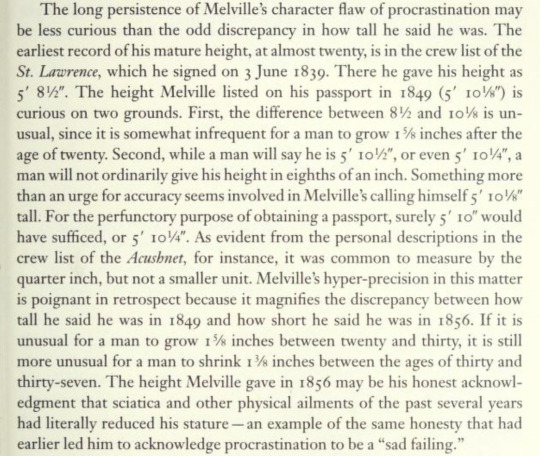
This has no right being as funny as it is
#the end is sad don’t look at that don’t look#Herman Melville#from herman melville: a biography by hershel parker vol 2
2 notes
·
View notes
Text


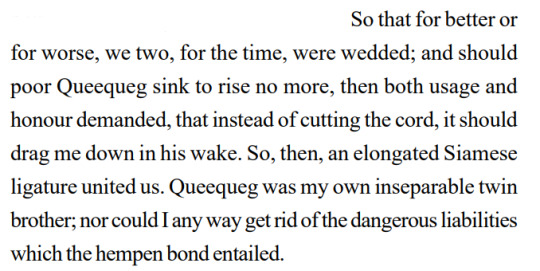





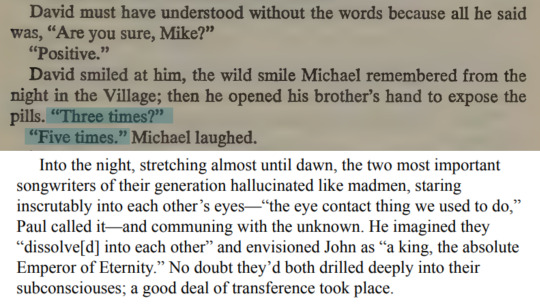

"You see, John and I grew up like twins although he was a year and a half older than me. We grew up literally in the same bed because when we were on holiday, hitchhiking or whatever, we would share a bed. Or when we were writing songs as kids he'd be in my bedroom or I'd be in his. Or he'd be in my front parlour or I'd be in his, although his Aunt Mimi sometimes kicked us out into the vestibule!"
"I think Linda put her finger on it when she said me and John were like mirror images of each other. Even down to how we started writing together, facing each other, eyeball to eyeball, exactly like looking in the mirror."
twins, bari wood; moby dick, herman melville; the beatles: the biography, bob spitz; dead ringers, cronenberg
#someone needs to volunteer to euthanize me atp.#when the mclennon pseudo-incestual vibes hit#they wouldve loved being conjoined twins fr#beatles
162 notes
·
View notes
Text
the unofficial ultimate bungo stray dogs reading list
this is mainly for myself bc i rly do want to read most if not all of these and i'm sure it's already been done by someone somewhere. but, i thought why not post it lmao; most if not all of these can be found on anna's archive, z-library, or project gutenberg! (also, consider buying from your local bookstore!) for those that are a bit harder to find, i've included links, though some are from j-stor and would require login to access.
detective agency:
osamu dazai:
no longer human (novel)
the setting sun (novel)
nakajima atsushi:
the moon over the mountain: stories (short story collection)
light, wind and dreams (short story)
fukuzawa yukichi:
an encouragement of learning (17 volume collections of writings)
all the countries of the world, for children written in verse (textbook)
yosano akiko:
kimi shinitamou koto nakare (poem)
midaregami (poetry collection)
edogawa ranpo:
the boy detectives club (book series)
japanese tales of mystery and imagination (short story collection)
the early cases of akechi kogoro (novel)
kunikida doppo:
river mist and other stories (short story collection)
izumi kyouka:
demon lake (play)
spirits of another sort: the plays of izumi kyoka (play collection)
tanizaki junichirou:
the makioka sisters (novel)
the red roof and other stories (short story collection)
miyazawa kenji:
ame ni mo makezu; be not defeated by the rain (poem)
night on the galactic railroad (novel)
strong in the rain (poetry collection)
port mafia:
mori ougai:
vita sexualis (novel)
the dancing girl (novel)
nakahara chuuya:
poems of nakahara chuya (poetry collection)
akutagawa ryuunosuke:
rashoumon (short story)
the spider's thread (short story)
rashoumon and other stories (short story collection)
ozaki kyouyou:
the gold demon (novel)
higuchi ichiyou:
in the shade of spring leaves (biography and short stories)
hirotsu ryuurou:
falling camellia (novel)
tachihara michizou:
in mourning for the summer (poem)
midwinter momento (poem)
from the country of eight islands: an anthology of japanese poetry (poetry collection)
kajii motojirou:
lemon (short story)
yumeno kyuusaku:
dogra magra (novel)
oda sakunosuke:
flawless/immaculate (short story)
sakaguchi ango:
darakuron (essay)
the guild:
f. scott fitzgerald:
the great gatsby (novel)
the beautiful and the damned (novel)
edgar allen poe:
the raven (poem)
the black cat (short story)
the murders in the rue morgue (short story)
herman melville:
moby dick (novel)
h.p. lovecraft:
the call of cthulhu (short story)
the shadow out of time (novella)
john steinbeck:
the grapes of wrath (novel)
of mice and men (novel)
lucy maud montgomery:
anne of green gables (novel)
the blue castle (novel)
chronicles of avonlea (short story collection)
louisa may alcott:
little women (novel)
the brownie and the princess (short story collection)
margaret mitchell:
gone with the wind (novel)
mark twain:
the adventures of tom sawyer (novel)
adventures of huckleberry finn (novel)
nathaniel hawthorn:
the scarlet letter (novel)
rats in the house of the dead:
fyodor dostoevsky:
crime and punishment (novel)
the brothers karamozov (novel)
notes from the underground (short story collection)
alexander pushkin:
eugene onegin (novel)
a feast in time of plague (play)
ivan goncharov:
the precipice (novel)
oguri mushitarou:
the perfect crime (novel)
decay of the angel:
fukuchi ouchi:
the mirror lion, a spring diversion (kabuki play)
bram stoker:
dracula (novel)
dracula's guest and other weird stories (short story collection)
nikolai gogol:
the overcoat (short story)
dead souls (novel)
hunting dogs: (i must caveat here that the hunting dogs are named after much more comparatively obscure jpn writers/playwrights so i was unable to find a lot of the specific pieces actually mentioned; but i still wanted to include them on the list because well -- it wouldn't be a bsd list without them)
okura teruko:
gasp of the soul (short story; i wasn't able to find an english translation)
devil woman (short story)
jouno saigiku:
priceless tears (kabuki play; no translation but at least we have a summary)
suehiro tetchou:
setchuubai/a political novel: plum blossoms in snow (novel)
division for unusual powers:
taneda santouka:
the santoka: versions by scott watson (poetry collection)
tsujimura mizuki:
lonely castle in the mirror (novel)
yesterday's shadow tag (short story collection; i was unable to find a translation)
order of the clock tower:
agatha christie:
and then there were none (novel)
murder on the orient express (novel)
she is the best selling fiction writer of all time there's too much to list here
mimic:
andre gide:
strait is the gate (novel)
trascendents:
arthur rimbaud:
illuminations (poetry collection)
the drunken boat (poem)
a season in hell (prose poem)
johann von goethe:
faust
the sorrows of young werther
paul verlaine:
clair de lune (poem, yes it did inspire the debussy piece, yes)
poems under saturn (poetry collection)
victor hugo:
the hunchback of notre-dame (novel)
les miserables (novel)
william shakespeare:
romeo and juliet (play)
a midsummer nights' dream (play)
sonnets (poetry collection)
the seven traitors:
jules verne:
around the world in 80 days (novel)
journey to the center of the earth (novel)
twenty thousand leagues under the seas (novel)
other:
natsume souseki:
i am a cat (novel)
kokoro (novel)
botchan (novel)
h.g. wells:
the time machine (novella)
the invisible man (novel)
the war of the worlds (novel)
shibusawa tatsuhiko:
the travels of prince takaoka (novel; unable to find translation)
dr. mary wollstonecraft godwin shelley
frankenstein (novel)
#bungo stray dogs#bsd#literature#dark academia#reading list#academia#i'm sure there's people i've missed but i did my best LOL#this also really throws into a stark contrast how relatively un-worldly american literary curriculums really are#obviously; it makes vague sense to focus american literary schooling on the western 'canon' bc so much of the english language#is influenced by it and the 'culture' is more touched by it but HOLY SHIT does it just... astound me#how uneducated i am on even east asian literature (from wheremst i technically hail!!!)#i know like.... maybe 3?? 4??? chinese writers off cuff???#like the only reason i even know anything about jpn literature is i got my minor in jpn so i read some stuff but WOWWWWW there's a wORLD.#the fact that i knew not a SINGLE work by most of these jpn writers but as soon as we got to the guild members#i didn't even have to fucking google/wiki -- i just KNEW off the top of my head#kinda fucked up tbh;;;;#anyway this list is massive but i think at least dipping my foot into some of the poems/short stories will be fun
61 notes
·
View notes
Text
How we explain the evils of the world – and the darkest parts of ourselves – has preoccupied humans throughout history. A sweeping and comprehensive search for the origins of belief in a Satanic figure across the centuries, The Devil’s Best Trick is a keen investigation into the inescapable reality of evil and the myriad ways we attempt to understand it. Instructive, riveting, and unnerving, this is a profound rumination on crime, violence, and the darkness in all of us.
In The Devil’s Best Trick, Randall Sullivan travels to Catemaco, Mexico, to participate in the “Hour of the Witches” — an annual ceremony in which hundreds of people congregate in the jungle south of Vera Cruz to negotiate terms with El Diablo. He takes us through the most famous and best-documented exorcism in American history, which lasted four months. And, woven throughout, he delivers original reporting on the shocking story of a small town in Texas that, one summer in 1988, unraveled into paranoia and panic after a seventeen-year-old boy was found hanging from the branch of a horse apple tree and rumors about Satanic worship and cults spread throughout the wider community.
Sullivan also brilliantly melds historical, religious, and cultural conceptions of evil: from the Book of Job to the New Testament to the witch hunts in Europe in the 15th through 17th centuries to the history of the devil-worshipping “Black Mass” ceremony and its depictions in 19th-century French literature. He brings us through to the “Satanic Panic” of the 1980s and the story of one brutal serial killer, pondering the psychology of evil. He weaves in writings by John Milton, William Blake, Oscar Wilde, Edgar Allan Poe, Nathaniel Hawthorne, Herman Melville, Mark Twain, and many more, among them Charles Baudelaire, from whose work Sullivan took the title of the book.
Nimble and expertly researched, The Devil’s Best Trick brilliantly melds cultural and historical commentary and a suspenseful true-crime narrative. Randall Sullivan, whose reportage and narrative skill has been called “extraordinary” and “enthralling” by Rolling Stone, takes on a bold task in this book that is both biography of the Devil and a look at how evil manifests in the world.
5 notes
·
View notes
Text
Le père a perduré dans la mémoire du fils non comme un commerçant américain ou un employé. Dans le souvenir d'Herman, Allan Melville était un gentleman cosmopolite, et le sang du comte de Melville House et d'ancêtres plus lointains, comme celui d'une reine de Hongrie et de rois de Norvège, coulait dans ses veines. Aux yeux d'Herman, son père était un des plus grands voyageurs du monde [...], un être héroïque qui lui racontait des histoires d'impressionnantes aventures maritimes et terrestres. Et plus fascinant encore : quand un Français entrait dans son magasin, Allan Melville devenait un homme profondément mystérieux, car le « Pa » familier s'exprimait alors dans une langue aussi incompréhensible pour son fils que celle parlée par Dieu.
Hershel Parker - « Herman Melville : A Biography, Volume 1, 1819-1851 » - Ed : The Johns Hopkins University Press, 1996
2 notes
·
View notes
Text
WHALE WEEKLY: ABOUT THE AUTHOR!
Whale Weekly has started!
Moby Dick is a novel that features themes of revenge, sexuality, man vs nature, fate and free will, the limits of knowledge, among others!
An important part to understanding and analyzing literature is knowing the author and context in which it was written.

Herman Melville (August 1st, 1819 - September 28, 1891) was an American novelist, short story writer, and poet during the American Renaissance. He was born to a wealthy father, but his death (1832) left the family in dire straits. His mother would become more religious in an effort to cope with the grief. He worked as a clerk and school teacher as a young boy, eventually taking a job on a merchant vessel when he was 20. Between 1839-1844 Melville worked periodically on whaling ships and other vessels. He jumped one ship, and participated in a mutiny on another. He lived in Polynesia briefly before joining another whaling ship, which discharged him in Hawaii. After working odd jobs for a few months he joined the Navy and was discharged October 14th 1844.
His experiences at sea and living in Polynesia were used to write multiple novels. An endeavor which his family encouraged. Herman Melville married Elizabeth "Lizzie" Knapp Shaw married August 4th, 1847 and would have two children by the time he published Moby Dick.
In 1850 Melville met Nathaniel Hawthorne, who had written reviews on Melville's books before. They had a close friendship for a few years before becoming estranged. There is evidence that Melville had romantic feelings for the friend who was fifteen years his senior.
Moby Dick was a commercial failure at the time with mixed reviews.
So as you read the book remember that Herman was a man who went from living comfortably to dealing poverty with the death of his father and the debts he left behind. He lived through the economic crisis Panic of 1837. He worked during the height of the whaling.
Sources:
Herman Melville - Wikipedia
Herman Melville | Books, Facts, & Biography
#tumblr university#tumblr book club#whale weekly#whale weekly about the author#moby dick#herman melville#call me ishmael#original content
5 notes
·
View notes
Text
In don’t know Herman Melville’s biography but marveling at how he didn’t bore himself to death while writing Moby-Dick I wouldn’t be the least surprised if he did die over the unfinished pages. Ugh…
0 notes
Note
I don't know about obsession, but if i may ask...
Do you like Moby Dick because it may be based in a true story or because it's written so well??
It's certainly inspired by the true story of the Essex, which was rammed by a sperm whale. Back in the old days it was considered kind of unseemly to write pure fiction. Novels needed to be a travelogue or a biography or a historical account or a religious morality tale - at least on the surface. Pure fiction was too much like a lie, and could get you a dark reputation.
So yes, most of Melville's books were "based" on real events, either others' accounts or stories from his own colourful youth and later travels. But once you read them, you see the narrative is just an excuse for explorations of social or philosophical themes and ideas. Though his first two books were more straightforward travelogues, he couldn't afterwards write anything straightforward to save his life. His readers at the time felt betrayed by this - they'd liked his funny, scary adventures in the South Seas! - but they didn't understand the rest and stopped buying his books. Melville eventually gave up his writing career, got a day job, and died in obscurity.
I mention all this because Herman Melville the man is a big reason why I like Herman Melville's writing. His life was fascinating, sad, and we know a lot about it. It's brilliant stuff to study. His writing, too, is fascinating and sad. I'll just stick to Moby-Dick here but I love all his work.
Moby-Dick was the first novel I ever read that felt like the author was speaking directly to me. I was in high school when I first came across it - I was going through a pirate phase and it was on my list - and it stopped me dead in my tracks. It's not just a novel; it's an anachronistic multimedia experiment. It mixes prose and script and poetry and quotes and dictionary entries with elegant language and salty sailor speak. It's eloquent and disgusting, elevated and deeply down in the dirt and foam. It is an explosion of contrast, a constant seesaw back and forth between the narrative reality of a captain obsessively hunting a whale, and a common sailor named Ishmael reflecting on what that hunt means, what whales mean, what the colour white means, what the sky means, what the universe means. In his ruminations, nothing is dismissed. He wasn't dusty Hawthorne obsessing over the Bible; instead he was a sailor with a wide but naive breadth of knowledge of "Eastern religions," Asian history, "South Seas cannibals," so you never know what he's going to bring up. His was the kind of eclectic thinking that you didn't often see expressed with such eloquence in the 1850s.
So yeah, I like it a lot because it's written really well :)
But also, it's very raw, and you feel the sloppy earnestness of Melville on every page. He's trying so hard to communicate with you and - knowing that so many of his contemporaries didn't understand him - it makes you feel kind of special and connected with him when you do understand what he's saying, and you agree. It's a novel that benefits in a very unique way from NOT murdering the author; from understanding who the author was, what he went through, how exuberant he was for so long and then how much the exigencies of publishing and finances beat him down.
We people who love Moby-Dick tend to really love Moby-Dick. I'm certain Melville himself is a big reason for this. We connect with his struggles. We celebrate the immortality of all artists by raising up his work and reaching back through the centuries to take his tarry hand.
101 notes
·
View notes
Text
Just for fun I made a page on my blog with book suggestions for Black Sails fans, but I think it’s impossible to get there on mobile and I’d like some people to actually see it so I’m making a post for it too :) Here it is under the cut. Enjoy, and let me know if there’s anything you would add to the list!
Books directly referenced within the show:
- Meditations by Marcus Aurelius – self-explanatory.
- The Odyssey by Homer – I think the translation Flint is most likely to have read is Chapman and it’s worth skimming that for a sense of the language, but if you want something more readable for a modern audience, I recommend Emily Wilson (and even if you don’t read the whole thing, her introduction where she talks about the nature of translation is really interesting).
- Don Quixote and La Galatea by Miguel de Cervantes – I haven’t read La Galatea, but it’s the one Flint leaves for Miranda as an apology. Don Quixote of course is referenced by both the Hamiltons and Madi.
- The Pilgrim’s Progress by John Bunyan – I haven’t read this either, but it’s a very influential text (referenced in both Little Women and Vanity Fair, for example, to give an idea of its wide range) so it’s good to know at least a little about it, and this post by starbuck is really good meta as to why Flint might be reading it when he’s in the fort.
- Something (possibly The Changeling) by Thomas Middleton – Again, I haven’t read this, but interesting post here by flintsmintsplint about the significance of this book choice.
- A Cruising Voyage Round the World by Woodes Rogers – Heads up this is a fairly awful read, except when he tries to describe animals, at which points he’s unintentionally pretty funny.
- The Bible I guess, particularly Genesis (quoted by both Thomas and Flint), Song of Solomon (quoted by Miranda), and Revelation (just a vibe, plus it’s briefly referenced in Treasure Island)
Other books, in no particular order, which are relevant, or which I think could give you valuable perspective or additional things to think about, or which might appeal to people who like the show:
- Treasure Island by Robert Louis Stevenson – Duh.
- Dreams of Exile by Ian Bell – A biography of RLS. Not the best bio in the world (a little boring at times, and Bell’s fixation on RLS’s mommy kink is grating) but there are interesting points especially on the ideas of duality, identity, and the power of a place, which are so central to his fiction.
- The Republic of Pirates: Being the True and Surprising Story of the Caribbean Pirates and the Man Who Brought Them Down by Colin Woodard – A good basic source about the real people and events in Black Sails. I’m pretty certain the writers of the show consulted this book.
- Shakespeare – The Tempest seems like an obvious start (I doubt Miranda’s name was an accident) and when you’re done with that you can check out Aimé Césaire’s postcolonial reimagining A Tempest.
- Jekyll and Hyde by Robert Louis Stevenson – It is unbelievable to me that no one has written a J&H fic about Flint yet. Also this story contains one of the three funniest lines RLS ever wrote in my opinion.
- The Iliad by Homer, The Aeneid by Virgil, and The Metamorphoses by Ovid
- Paradise Lost by John Milton – Check out this post.
- Frankenstein by Mary Shelley – If Flint lived a hundred years later he would have been a Romantic, I feel this in my soul, and I want to read this book in particular to him SO BADLY. Same kind of logic as Paradise Lost, except I actually like this one.
- Moby Dick by Herman Melville – There’s homoeroticism and it’s set on a ship, what more do you want?
- Why Homer Matters by Adam Nicolson – I am constantly screaming about Flint and Silver as Odysseus.
- The poetry of Elizabeth Bishop – Her poem “The Weed” is eerily reminiscent of the final silverflint confrontation(s) but honestly the rest of the collection has nothing to do with BS, I’m just in love with her and wanted to give her a rec while I have your attention.
- She Would Be King by Wayétu Moore – Not technically magical realism, because that’s a culturally specific term, but it’s like magical realism. It’s a retelling of the creation of the country of Liberia, and it is so good. I’m putting it on this list because it’s an exploration of how marginalized and enslaved people can have their own power in the face of colonization.
- The Deep by Rivers Solomon – “One can only go for so long without asking who am I? Where do I come from? What does all this mean? What is being? What came before me, and what might come after? Without answers, there is only a hole, a hole where a history should be that takes the shape of an endless longing.” Interesting exploration of community and history and generational trauma and pain and identity and the scars of white supremacy.
- A Field Guide to Getting Lost and The Faraway Nearby by Rebecca Solnit – Just vibes I guess. The second one especially has a lot of focus on stories, and if I ever write the silverflint Eros/Psyche AU that lives in my heart I’ll definitely be thinking about her words.
- Meadowlands by Louise Glück – An Odyssey-inspired collection of poems. I don’t love the book as a whole, but there are a few gems, including that one poem I’m crazy about.
- On Earth We’re Briefly Gorgeous by Ocean Vuong – You have seen passages from this book posted on tumblr. I know for a fact that at least two (the one about drowning before meeting the other person and the one about the word monster and lighthouses) have been used in (really beautiful) Black Sails edits. I think it’s important to read the whole context. It’s intense and deeply personal. His poetry book Night Sky with Exit Wounds is also powerful – “I write things / down. I build a life & tear it apart / & the sun keeps shining. Crescent / wave. Salt-spray. Tsunami. I have / enough ink to give you the sea / but not the ships, but it’s my book / & I’ll say anything just to stay inside / this skin.”
- The Lost Books of the Odyssey by Zachary Mason – A story is true a story is untrue etc.
- From the Beast to the Blonde: On Fairy Tales and Their Tellers by Marina Warner – Such an interesting book. Definitely check out what she has to say about gossip.
- Maurice by E.M. Forster – this parallel
- Les Miserables by Victor Hugo – Some of the themes might resonate, plus maybe you’ll be inspired to read my Silver=Grantaire fic lol
- Lighthousekeeping by Jeanette Winterson – Another one you’ve probably seen used in Black Sails edits, and for good reason. The main character’s name is Silver, there are direct references to RLS and Treasure Island, and it’s a story all about stories and inner darkness and that sort of thing. Kind of a weird book structurally, but some lovely language. Also worth reading some of Winterson’s other work, especially her memoir Why Be Happy When You Could Be Normal?
- When Captain Flint Was Still a Good Man by Nick Dybek – A fucked up little novel which, despite the title, has almost nothing at all to do with Treasure Island. Last few sentences pack a punch.
- Folklore and the Sea by Horace Beck – Feels even longer than it is, rambling and hard to get through, and also kind of outdated (sometimes verging on offensive) – but it does have some pretty interesting sections.
- The Mermaid, the Witch, and the Sea by Maggie Tokuda-Hall – queer love, a genderfluid protagonist, piracy and other evils as a response to imperialism and colonialism, mermaids…
- Pirate Women: The Princesses, Prostitutes, and Privateers Who Ruled the Seven Seas by Laura Sook Duncombe – Has some issues, especially a kind of annoying girlbossy tone, but is interesting.
- Flint and Silver: A Prequel to Treasure Island by John Drake – Unlike everything else on this list, this one is actively an anti-recommendation, in case you happen to come across the title somewhere and say “oh, a book called Flint and Silver, I have to read that!” Do not do it. It is so bad.
Edited later to add:
- A Clash of Steel by C.B. Lee – a total reimagining of Treasure Island as a queer romance about Chinese and Vietnamese girls and women. I loved this book! Two particular characters from the original were merged into one character which would never have occurred to me and it was SUCH a good reveal.
- The Last Smile in Sunder City by Luke Arnold – It’s by Luke Arnold.
- When Women Were Dragons by Kelly Barnhill – About women (especially queer and otherwise nonconforming women) in the 1950s refusing to be silenced and controlled. Because they’re dragons.
- The Arabian Nights – I recommend the new(ish) version translated by Yasmine Seale and annotated by Paolo Lemos Horta, which is enormous but really interesting. This is a really foundational text that has consciously or unconsciously influenced a lot of other stories, and I don’t think it’s a leap to guess that Treasure Island, Black Sails, and some of the other books on my list are among them. Plus, here’s a quote from the introduction that might give off some familiar vibes: “Every story in the global canon of fantastical literature is in some way a vessel shipwrecked on the rocks of its misinterpretation… Assessed in these terms, One Thousand and One Nights is perhaps the greatest and most sprawling ruin of them all.”
- Cinnamon and Gunpowder by Eli Brown – Some poor bastard finds himself stuck as the cook on a pirate ship, gets his leg amputated, and falls in love with the ruthless captain. Hmm.
- A Conspiracy of Truths and A Choir of Lies by Alexandra Rowland – Explores the roles of storytellers in society through the misadventures of really fascinating unreliable narrators.
- The Drowning Empire trilogy (beginning with The Bone Shard Daughter) by Andrea Steward – a very compelling fantasy series which I initially picked up primarily because the covers look kind of like the Black Sails intro sequence
- Silver Under Nightfall by Rin Chupeco, which yes! I did look at entirely because it had Silver in the title. It’s a vampire book and it has some weaknesses BUT it’s a polyamorous romance which counts for a lot.
30 notes
·
View notes
Text
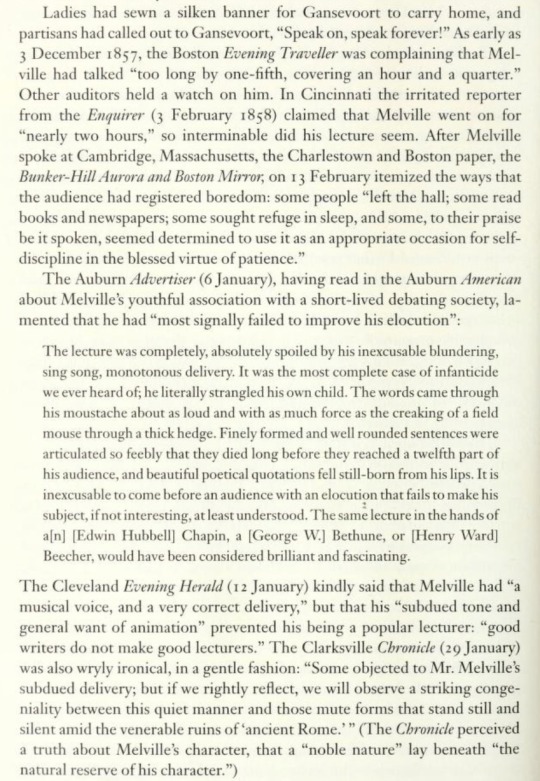
“It was the most complete case of infanticide we ever heard of, he literally strangled his own child.”
—this is next level hating. Insane how many insults towards Herman Melville are huddled within this single page. Starting off with juxtaposing his older brother’s success against him was enough for me and then it just kept getting worse.
#my math exam went horrifically thank you for asking. yes you#the prof didn’t put half of what was on the study list onto the exam and added random Qs instead#do you want to know how many hours I’ve spent these past couple days trying to understand stupid calc II mixture volume tank problems? no?#yeah probably not#to feel better I decided to read and then I get hit in the face with this#from herman melville: a biography by hershel parker vol 2#Herman Melville
1 note
·
View note
Note
Hi there! Do you have a meta on Sara's biography but more focused on her education background?
hi, anon!
yup, here and here.
the "cliff notes" version:
since hers is a mid-september birthday, sara likely either began attending kindergarten "early" at age four (around two weeks shy of her fifth birthday) OR late at a couple of weeks before her sixth birthday (as the typical california cutoff date for kindergarten admissions is september 1st). personally, i lean more toward the earlier option, as i think it's highly likely she was probably already reading and kindergarten-ready by that age.
at some point during her elementary, middle, and/or high school years, she seems to have skipped at least two grade levels, though we don't know when or under what circumstances she did so.
however, the fact that she managed to do so is very impressive not only for the usual reasons but also considering that as a foster child, she likely moved schools/districts fairly frequently.
we know she was an advanced reader at an early age, as she reports in episode 05x21 "committed" that she read moby dick by herman melville as a fifth grader.
in episode 02x04 "bully for you," she describes herself as having been a "science nerd" in high school.
per her old cbs character biographies, sara graduated from high school as the class valedictorian at age sixteen.
shortly thereafter, she became a legally emancipated minor and left the foster care system.
at this point, she was awarded a full-ride scholarship and early admission to harvard university in cambridge, massachusetts and moved cross-country from california to attend school there.
sara most likely started her undergraduate coursework at harvard in late august or early september '88, i.e., about two or three weeks before her seventeenth birthday.
based on comments she makes in episode 01x09 "unfriendly skies," she seems to have still been at harvard in '92, which indicates that she probably took ~5 years to complete her bs there, probably because even though she was on a full-ride scholarship, she still had to work to put herself through school and build up some savings due to her unique situation as an emancipated minor with no post-graduation financial safety net otherwise.
her bs was in theoretical physics.
in real life, there is no standalone master's degree program in physics at uc berkeley—only a phd program with an optional embedded master's degree track built in—however, per her old cbs biographies, she did earn a master's degree in physics from uc berkeley (emphasis unspecified).
if one wants to try to make sense of this incongruity between fact and fiction, then one could maybe infer that she was accepted to the physics doctoral program at berkeley and completed the ma requirements before leaving school short of completing her phd (possibly due to money issues or just losing interest and diverting into law enforcement instead).
while at berkeley, sara took part in a work-study program that placed her at the san francisco coroner's office, which is the route by which she eventually found her way into the field of criminalistics after grad school.
though we don't have exact dates for her graduations from either harvard or berkeley, she was likely still pretty young at the time when she earned her master's degree (approx. 23/24 years old).
thanks for the question! please feel welcome to send another any time!
15 notes
·
View notes
Text
Read Like a Gilmore
All 339 Books Referenced In “Gilmore Girls”
Not my original list, but thought it’d be fun to go through and see which one’s I’ve actually read :P
If it’s in bold, I’ve got it, and if it’s struck through, I’ve read it. I’ve put a ‘read more’ because it ended up being an insanely long post, and I’m now very sad at how many of these I haven’t read. (I’ve spaced them into groups of ten to make it easier to read)
1. 1984 by George Orwell
2. Adventures of Huckleberry Finn by Mark Twain
3. Alice in Wonderland by Lewis Carroll
4. The Amazing Adventures of Kavalier & Clay by Michael Chabon
5. An American Tragedy by Theodore Dreiser
6. Angela’s Ashes by Frank McCourt
7. Anna Karenina by Leo Tolstoy
8. The Diary of a Young Girl by Anne Frank
9. The Archidamian War by Donald Kagan
10. The Art of Fiction by Henry James
11. The Art of War by Sun Tzu
12. As I Lay Dying by William Faulkner
13. Atonement by Ian McEwan
14. Autobiography of a Face by Lucy Grealy
15. The Awakening by Kate Chopin
16. Babe by Dick King-Smith
17. Backlash: The Undeclared War Against American Women by Susan Faludi 18. Balzac and the Little Chinese Seamstress by Dai Sijie
19. Bel Canto by Ann Patchett
20. The Bell Jar by Sylvia Plath
21. Beloved by Toni Morrison
22. Beowulf: A New Verse Translation by Seamus Heaney
23. The Bhagava Gita
24. The Bielski Brothers: The True Story of Three Men Who Defied the Nazis, Built a Village in the Forest, and Saved 1,200 Jews by Peter Duffy
25. Bitch in Praise of Difficult Women by Elizabeth Wurtzel
26. A Bolt from the Blue and Other Essays by Mary McCarthy
27. Brave New World by Aldous Huxley
28. Brick Lane by Monica Ali
29. Bridgadoon by Alan Jay Lerner
30. Candide by Voltaire
31. The Canterbury Tales by Chaucer
32. Carrie by Stephen King
33. Catch-22 by Joseph Heller
34. The Catcher in the Rye by J. D. Salinger
35. Charlotte’s Web by E. B. White
36. The Children’s Hour by Lillian Hellman
37. Christine by Stephen King
38. A Christmas Carol by Charles Dickens
39. A Clockwork Orange by Anthony Burgess
40. The Code of the Woosters by P.G. Wodehouse
41. The Collected Stories by Eudora Welty
42. A Comedy of Errors by William Shakespeare
43. Complete Novels by Dawn Powell
44. The Complete Poems by Anne Sexton
45. Complete Stories by Dorothy Parker
46. A Confederacy of Dunces by John Kennedy Toole
47. The Count of Monte Cristo by Alexandre Dumas
48. Cousin Bette by Honore de Balzac
49. Crime and Punishment by Fyodor Dostoevsky
50. The Crimson Petal and the White by Michel Faber
51. The Crucible by Arthur Miller
52. Cujo by Stephen King
53. The Curious Incident of the Dog in the Night-Time by Mark Haddon
54. Daughter of Fortune by Isabel Allende
55. David and Lisa by Dr Theodore Issac Rubin M.D
56. David Copperfield by Charles Dickens
57. The Da Vinci Code by Dan Brown
58. Dead Souls by Nikolai Gogol
59. Demons by Fyodor Dostoyevsky
60. Death of a Salesman by Arthur Miller
61. Deenie by Judy Blume
62. The Devil in the White City: Murder, Magic, and Madness at the Fair that Changed America by Erik Larson
63. The Dirt: Confessions of the World’s Most Notorious Rock Band by Tommy Lee, Vince Neil, Mick Mars and Nikki Sixx
64. The Divine Comedy by Dante
65. The Divine Secrets of the Ya-Ya Sisterhood by Rebecca Wells
66. Don Quixote by Cervantes
67. Driving Miss Daisy by Alfred Uhrv
68. Dr. Jekyll & Mr. Hyde by Robert Louis Stevenson
69. Edgar Allan Poe: Complete Tales & Poems by Edgar Allan Poe
70. Eleanor Roosevelt by Blanche Wiesen Cook
71. The Electric Kool-Aid Acid Test by Tom Wolfe
72. Ella Minnow Pea: A Novel in Letters by Mark Dunn
73. Eloise by Kay Thompson
74. Emily the Strange by Roger Reger
75. Emma by Jane Austen
76. Empire Falls by Richard Russo
77. Encyclopedia Brown: Boy Detective by Donald J. Sobol
78. Ethan Frome by Edith Wharton
79. Ethics by Spinoza
80. Europe through the Back Door, 2003 by Rick Steves
81. Eva Luna by Isabel Allende
82. Everything Is Illuminated by Jonathan Safran Foer
83. Extravagance by Gary Krist
84. Fahrenheit 451 by Ray Bradbury
85. Fahrenheit 9/11 by Michael Moore
86. The Fall of the Athenian Empire by Donald Kagan
87. Fat Land: How Americans Became the Fattest People in the World by Greg Critser
88. Fear and Loathing in Las Vegas by Hunter S. Thompson
89. The Fellowship of the Ring by J. R. R. Tolkien
90. Fiddler on the Roof by Joseph Stein
91. The Five People You Meet in Heaven by Mitch Albom
92. Finnegan’s Wake by James Joyce
93. Fletch by Gregory McDonald
94. Flowers for Algernon by Daniel Keyes
95. The Fortress of Solitude by Jonathan Lethem
96. The Fountainhead by Ayn Rand
97. Frankenstein by Mary Shelley
98. Franny and Zooey by J. D. Salinger
99. Freaky Friday by Mary Rodgers
100. Galapagos by Kurt Vonnegut
101. Gender Trouble by Judith Butler
102. George W. Bushism: The Slate Book of the Accidental Wit and Wisdom of our 43rd President by Jacob Weisberg
103. Gidget by Fredrick Kohner
104. Girl, Interrupted by Susanna Kaysen
105. The Gnostic Gospels by Elaine Pagels
106. The Godfather: Book 1 by Mario Puzo
107. The God of Small Things by Arundhati Roy
108. Goldilocks and the Three Bears by Alvin Granowsky
109. Gone with the Wind by Margaret Mitchell
110. The Good Soldier by Ford Maddox Ford
111. The Gospel According to Judy Bloom
112. The Graduate by Charles Webb
113. The Grapes of Wrath by John Steinbeck
114. The Great Gatsby by F. Scott Fitzgerald
115. Great Expectations by Charles Dickens
116. The Group by Mary McCarthy
117. Hamlet by William Shakespeare
118. Harry Potter and the Goblet of Fire by J. K. Rowling
119. Harry Potter and the Sorcerer’s Stone by J. K. Rowling
120. A Heartbreaking Work of Staggering Genius by Dave Eggers
121. Heart of Darkness by Joseph Conrad
122. Helter Skelter: The True Story of the Manson Murders by Vincent Bugliosi and Curt Gentry
123. Henry IV, part I by William Shakespeare
124. Henry IV, part II by William Shakespeare
125. Henry V by William Shakespeare
126. High Fidelity by Nick Hornby
127. The History of the Decline and Fall of the Roman Empire by Edward Gibbon
128. Holidays on Ice: Stories by David Sedaris
129. The Holy Barbarians by Lawrence Lipton
130. House of Sand and Fog by Andre Dubus III
131. The House of the Spirits by Isabel Allende
132. How to Breathe Underwater by Julie Orringer
133. How the Grinch Stole Christmas by Dr. Seuss
134. How the Light Gets In by M. J. Hyland
135. Howl by Allen Ginsberg
136. The Hunchback of Notre Dame by Victor Hugo
137. The Iliad by Homer
138. I’m With the Band by Pamela des Barres
139. In Cold Blood by Truman Capote
140. Inferno by Dante
141. Inherit the Wind by Jerome Lawrence and Robert E. Lee
142. Iron Weed by William J. Kennedy
143. It Takes a Village by Hillary Rodham Clinton
144. Jane Eyre by Charlotte Bronte
145. The Joy Luck Club by Amy Tan
146. Julius Caesar by William Shakespeare
147. The Jumping Frog by Mark Twain
148. The Jungle by Upton Sinclair
149. Just a Couple of Days by Tony Vigorito
150. The Kitchen Boy: A Novel of the Last Tsar by Robert Alexander
151. Kitchen Confidential: Adventures in the Culinary Underbelly by Anthony Bourdain
152. The Kite Runner by Khaled Hosseini
153. Lady Chatterleys’ Lover by D. H. Lawrence
154. The Last Empire: Essays 1992-2000 by Gore Vidal
155. Leaves of Grass by Walt Whitman
156. The Legend of Bagger Vance by Steven Pressfield
157. Less Than Zero by Bret Easton Ellis
158. Letters to a Young Poet by Rainer Maria Rilke
159. Lies and the Lying Liars Who Tell Them by Al Franken
160. Life of Pi by Yann Martel
161. Little Dorrit by Charles Dickens
162. The Little Locksmith by Katharine Butler Hathaway
163. The Little Match Girl by Hans Christian Andersen
164. Little Women by Louisa May Alcott
165. Living History by Hillary Rodham Clinton
166. Lord of the Flies by William Golding
167. The Lottery: And Other Stories by Shirley Jackson
168. The Lovely Bones by Alice Sebold
169. The Love Story by Erich Segal
170. Macbeth by William Shakespeare
171. Madame Bovary by Gustave Flaubert
172. The Manticore by Robertson Davies
173. Marathon Man by William Goldman
174. The Master and Margarita by Mikhail Bulgakov
175. Memoirs of a Dutiful Daughter by Simone de Beauvoir
176. Memoirs of General W. T. Sherman by William Tecumseh Sherman
177. Me Talk Pretty One Day by David Sedaris
178. The Meaning of Consuelo by Judith Ortiz Cofer
179. Mencken’s Chrestomathy by H. R. Mencken
180. The Merry Wives of Windsor by William Shakespeare
181. The Metamorphosis by Franz Kafka
182. Middlesex by Jeffrey Eugenides
183. The Miracle Worker by William Gibson
184. Moby Dick by Herman Melville
185. The Mojo Collection: The Ultimate Music Companion by Jim Irvin
186. Moliere: A Biography by Hobart Chatfield Taylor
187. A Monetary History of the United States by Milton Friedman
188. Monsieur Proust by Celeste Albaret
189. A Month Of Sundays: Searching For The Spirit And My Sister by Julie Mars 190. A Moveable Feast by Ernest Hemingway
191. Mrs. Dalloway by Virginia Woolf
192. Mutiny on the Bounty by Charles Nordhoff and James Norman Hall
193. My Lai 4: A Report on the Massacre and It’s Aftermath by Seymour M. Hersh
194. My Life as Author and Editor by H. R. Mencken
195. My Life in Orange: Growing Up with the Guru by Tim Guest
196. Myra Waldo’s Travel and Motoring Guide to Europe, 1978 by Myra Waldo 197. My Sister’s Keeper by Jodi Picoult
198. The Naked and the Dead by Norman Mailer
199. The Name of the Rose by Umberto Eco
200. The Namesake by Jhumpa Lahiri
201. The Nanny Diaries by Emma McLaughlin
202. Nervous System: Or, Losing My Mind in Literature by Jan Lars Jensen
203. New Poems of Emily Dickinson by Emily Dickinson
204. The New Way Things Work by David Macaulay
205. Nickel and Dimed by Barbara Ehrenreich
206. Night by Elie Wiesel
207. Northanger Abbey by Jane Austen
208. The Norton Anthology of Theory and Criticism by William E. Cain, Laurie A. Finke, Barbara E. Johnson, John P. McGowan
209. Novels 1930-1942: Dance Night/Come Back to Sorrento, Turn, Magic Wheel/Angels on Toast/A Time to be Born by Dawn Powell
210. Notes of a Dirty Old Man by Charles Bukowski
211. Of Mice and Men by John Steinbeck (will NEVER read again)
212. Old School by Tobias Wolff
213. On the Road by Jack Kerouac
214. One Flew Over the Cuckoo’s Nest by Ken Kesey
215. One Hundred Years of Solitude by Gabriel Garcia Marquez
216. The Opposite of Fate: Memories of a Writing Life by Amy Tan
217. Oracle Night by Paul Auster
218. Oryx and Crake by Margaret Atwood
219. Othello by Shakespeare
220. Our Mutual Friend by Charles Dickens
221. The Outbreak of the Peloponnesian War by Donald Kagan
222. Out of Africa by Isac Dineson
223. The Outsiders by S. E. Hinton
224. A Passage to India by E.M. Forster
225. The Peace of Nicias and the Sicilian Expedition by Donald Kagan
226. The Perks of Being a Wallflower by Stephen Chbosky
227. Peyton Place by Grace Metalious
228. The Picture of Dorian Gray by Oscar Wilde
229. Pigs at the Trough by Arianna Huffington
230. Pinocchio by Carlo Collodi
231. Please Kill Me: The Uncensored Oral History of Punk Legs McNeil and Gillian McCain
232. The Polysyllabic Spree by Nick Hornby
233. The Portable Dorothy Parker by Dorothy Parker
234. The Portable Nietzche by Fredrich Nietzche
235. The Price of Loyalty: George W. Bush, the White House, and the Education of Paul O’Neill by Ron Suskind
236. Pride and Prejudice by Jane Austen
237. Property by Valerie Martin
238. Pushkin: A Biography by T. J. Binyon
239. Pygmalion by George Bernard Shaw
240. Quattrocento by James Mckean
241. A Quiet Storm by Rachel Howzell Hall
242. Rapunzel by Grimm Brothers
243. The Raven by Edgar Allan Poe
244. The Razor’s Edge by W. Somerset Maugham
245. Reading Lolita in Tehran: A Memoir in Books by Azar Nafisi
246. Rebecca by Daphne du Maurier
247. Rebecca of Sunnybrook Farm by Kate Douglas Wiggin
248. The Red Tent by Anita Diamant
249. Rescuing Patty Hearst: Memories From a Decade Gone Mad by Virginia Holman
250. The Return of the King by J. R. R. Tolkien
251. R Is for Ricochet by Sue Grafton
252. Rita Hayworth by Stephen King
253. Robert’s Rules of Order by Henry Robert
254. Roman Holiday by Edith Wharton
255. Romeo and Juliet by William Shakespeare
256. A Room of One’s Own by Virginia Woolf
257. A Room with a View by E. M. Forster
258. Rosemary’s Baby by Ira Levin
259. The Rough Guide to Europe, 2003 Edition
260. Sacred Time by Ursula Hegi
261. Sanctuary by William Faulkner
262. Savage Beauty: The Life of Edna St. Vincent Millay by Nancy Milford
263. Say Goodbye to Daisy Miller by Henry James
264. The Scarecrow of Oz by Frank L. Baum
265. The Scarlet Letter by Nathaniel Hawthorne
266. Seabiscuit: An American Legend by Laura Hillenbrand
267. The Second Sex by Simone de Beauvoir
268. The Secret Life of Bees by Sue Monk Kidd
269. Secrets of the Flesh: A Life of Colette by Judith Thurman
270. Selected Hotels of Europe
271. Selected Letters of Dawn Powell: 1913-1965 by Dawn Powell
272. Sense and Sensibility by Jane Austen
273. A Separate Peace by John Knowles
274. Several Biographies of Winston Churchill
275. Sexus by Henry Miller
276. The Shadow of the Wind by Carlos Ruiz Zafon
277. Shane by Jack Shaefer
278. The Shining by Stephen King
279. Siddhartha by Hermann Hesse
280. S Is for Silence by Sue Grafton
281. Slaughter-house Five by Kurt Vonnegut
282. Small Island by Andrea Levy
283. Snows of Kilimanjaro by Ernest Hemingway
284. Snow White and Rose Red by Grimm Brothers
285. Social Origins of Dictatorship and Democracy: Lord and Peasant in the Making of the Modern World by Barrington Moore
286. The Song of Names by Norman Lebrecht
287. Song of the Simple Truth: The Complete Poems of Julia de Burgos by Julia de Burgos
288. The Song Reader by Lisa Tucker
289. Songbook by Nick Hornby
290. The Sonnets by William Shakespeare
291. Sonnets from the Portuegese by Elizabeth Barrett Browning
292. Sophie’s Choice by William Styron
293. The Sound and the Fury by William Faulkner
294. Speak, Memory by Vladimir Nabokov
295. Stiff: The Curious Lives of Human Cadavers by Mary Roach
296. The Story of My Life by Helen Keller
297. A Streetcar Named Desiree by Tennessee Williams
298. Stuart Little by E. B. White
299. Sun Also Rises by Ernest Hemingway
300. Swann’s Way by Marcel Proust
301. Swimming with Giants: My Encounters with Whales, Dolphins and Seals by Anne Collett
302. Sybil by Flora Rheta Schreiber
303. A Tale of Two Cities by Charles Dickens
304. Tender Is The Night by F. Scott Fitzgerald
305. Term of Endearment by Larry McMurtry
306. Time and Again by Jack Finney
307. The Time Traveler’s Wife by Audrey Niffenegger
308. To Have and Have Not by Ernest Hemingway
309. To Kill a Mockingbird by Harper Lee
310. The Tragedy of Richard III by William Shakespeare
311. A Tree Grows in Brooklyn by Betty Smith
312. The Trial by Franz Kafka
313. The True and Outstanding Adventures of the Hunt Sisters by Elisabeth Robinson
314. Truth & Beauty: A Friendship by Ann Patchett
315. Tuesdays with Morrie by Mitch Albom
316. Ulysses by James Joyce
317. The Unabridged Journals of Sylvia Plath 1950-1962 by Sylvia Plath 318. Uncle Tom’s Cabin by Harriet Beecher Stowe
319. Unless by Carol Shields
320. Valley of the Dolls by Jacqueline Susann
321. The Vanishing Newspaper by Philip Meyers
322. Vanity Fair by William Makepeace Thackeray
323. Velvet Underground’s The Velvet Underground and Nico (Thirty Three and a Third series) by Joe Harvard
324. The Virgin Suicides by Jeffrey Eugenides
325. Waiting for Godot by Samuel Beckett
326. Walden by Henry David Thoreau
327. Walt Disney’s Bambi by Felix Salten
328. War and Peace by Leo Tolstoy
329. We Owe You Nothing – Punk Planet: The Collected Interviews edited by Daniel Sinker
330. What Colour is Your Parachute? 2005 by Richard Nelson Bolles
331. What Happened to Baby Jane by Henry Farrell
332. When the Emperor Was Divine by Julie Otsuka
333. Who Moved My Cheese? by Spencer Johnson
334. Who’s Afraid of Virginia Woolf by Edward Albee
335. Wicked: The Life and Times of the Wicked Witch of the West by Gregory Maguire
336. The Wizard of Oz by Frank L. Baum
337. Wuthering Heights by Emily Bronte
338. The Yearling by Marjorie Kinnan Rawlings
339. The Year of Magical Thinking by Joan Didion
99 notes
·
View notes
Link
Here is ep # 2 http://www.someveryfamouspeople.com/?p=467
Herman Melville was so ahead of his time.
#herman melville#biography#moby dick#bartleby#podcasts#literature#literary criticism#Books and Literature#literary history#history
1 note
·
View note
Text
[…] Le soir du 10 décembre 1831, Allan Melvill traverse à pied le fleuve Hudson gelé. Dans son nouveau livre, Rodrigo Fresán fait de cet événement la matrice de l’œuvre à venir d’Herman Melville, fils d’Allan. À la fois roman, biographie, essai, récit poétique, Melvill mobilise une inventivité littéraire pour explorer les ressorts de la création, le poids de l’insuccès et, plus encore, les mystères de la transmission, l’amour entre un père et son fils ainsi que la faille qui s’ouvre quand le premier disparaît…[…]
Rodrigo Fresán, Melvill. Trad. de l’espagnol (Argentine) par Isabelle Gugnon. Seuil, 352 p., 23 €
3 notes
·
View notes
Text
PROCESS, ONE: A READER’S JOURNEY
“The essays in this book were memoir until they couldn’t stand to be memoir anymore.” —Leslie Jamison
Had I read that quote even only six months ago (the book to which she refers is her much-lauded personal essay collection The Empathy Exams), I wouldn’t have known exactly what it meant.
How can a piece of writing evolve from memoir? In terms of simple, unvarnished truth-telling, I thought the memoir, as a genre of literature, was pretty much the vessel. Yet here a case is being made for something that sounds like the opposite: it seems one can go beyond even the once terminally-regarded memoir.
Let me think about this further, about my confusion. Maybe my framing is off. Maybe it’s not an issue of evolution or reduction. It’s not that the personal essay is somehow purer than the memoir, as far as autobiographical writing is concerned. The issue is not one of authenticity. It’s about application, or even misapplication, that the quest for truth for which one naturally uses the data of one’s own life could, depending on the circumstances, be more appropriately undertaken in a different genre. The two genres are merely looking at different subject matter. They’re examining completely different lifeforms on the slides, but they’re using the same authentic microscope, as it were.
I relate to the sense of frustration in the Jamison quote, that there’s a feeling that the mission she started out on—writing a memoir—became so inadequate for the real task at hand that it became unbearable, that the pressure of working under a false guise gave way to a different form of transmission.
The memoir became a personal essay collection. It had to. The questions she was exploring could not be undertaken by simply telling the story of one’s own life. Personal data was necessary for the full picture. But she needed other sources, the experiences of others, the realities of phenomena outside of her normal experience, even as they were phenomena that ultimately she ended up relating to in a deeply intimate manner. In her collection, she let us into those experiences, and then we were able to relate, by dint of her fearless storytelling and personal excavations.
Now I’m getting it: a personal essay is fixed on some question and that is what drives the exploration. Personal, say, autobiographical, details are needed for the exploration, and this can vary depending on the subject. But the focus is the external question. That is the different lifeform on the slide. It’s about the question being pursued.
I.
But first, a look at where I started on this journey, with the memoir itself.
The memoir as a work of literature was my singular focus while I was crafting my book proposal a couple of years ago. Simply put, it was what was on the table. Owing to my provenance as a musician and an actor, and my express interest in writing about my life, the genre of the memoir naturally became a thing for me.
So I dove into acquainting myself, not with examples of celebrity memoirs or memoirs by politicians—perhaps the two most popular varieties—but with examples of the finer possibilities in those genres which—big surprise—happen to be written for the most part by writers. I found myself falling in love with the exercise of memoir writing, as opposed to, say, the gratuitous voyeurism that is often offered by the popular variants of the genre.
For me, what became valuable was the quality of the writing; most of the time I was reading the life stories of people with whose work I had, outside of the memoir being read, little to no familiarity. These windows into life were captivating in their own right, these portals into raw experience, the possibilities of narration within the genre of nonfiction, the enlightened self-awareness made evident in sculpting large-scale timelines of one’s own life.
----------------------------------
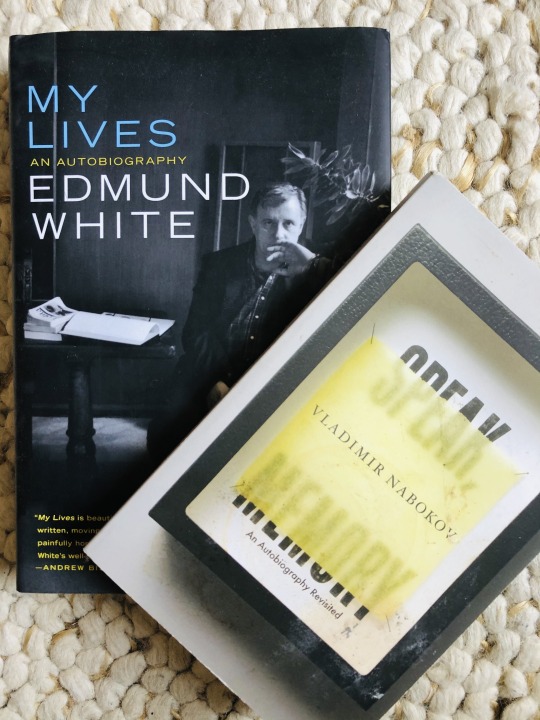
It’s difficult for me to overstate the degree to which these two books have influenced me thus far.
Nabokov’s memoir is well-known. It’s a work of literature in its own right. It is a great example of the possibilities of the memoir to accomplish something other than realism: the whole thing is a kind of Proustian meta-narrative of his childhood and abrupt departure from Russia after the revolution, like a dream of family life written down. Mary Karr, in The Art of Memoir, heads her chapter on this book, “Don’t Try This at Home: The Seductive, Narcissistic Count.” Indeed, the book reads somewhat Transylvanianly, a bold, exotic yarn full of strange characters unfurled for an audience unfamiliar with that way of life. It reads as alluring and dark, and, yes, quite vampiric. But it is also profound and gorgeous.
While it’s not really a memoir, more of an autobiography, and also not often regarded as exemplary of the form, My Lives, written by Edmund White is an incredible tour de force of portraiture of the most important people in his life, his therapists, his parents, his lovers, his friends, his subjects, they all get a chapter dedicated specifically to them. Imagine knowing a world-renowned painter who decides he wants to do a string of portraits of the most important people in his life and you are one of them. That’s what this is, in literary form. It’s less a story of him than of these people, but, by the end of the book, you, of course, end up knowing a lot about him. His ability to make you see the things that he is looking at, in a very concrete, physical way—the curves of a body, the angles of a face, the ambience of a train station—is unparalleled in my view.
Is there a difference between an (a) autobiography and a (b) memoir?
I think the difference is about scope. The autobiography is explicitly a functional genre that attempts to document a person’s entire life. It is a biography that is written by the person whose life is being written about. It does not usually try to invoke any literary devices and is intended to serve as an ancillary to consumption of the subject’s work outside of the autobiography. It is a kind of “reader” of the subject’s life. It’s main purpose is not to be written well (although if it isn’t it is a grave mistake), it is to convey the near entirety of the subject’s experience on earth.
By contrast, good writing is a bit more called-for in the memoir; otherwise the whole premise falls apart. The memoir, in carving out a specific “slice” of a person, either a period of time or some type of encounter or some activity that they always do, is explicitly intended to amplify and interrogate aspects of being. In this way, the memoir has more potential for inspiration and edification irrespective of the reader’s interest in the subject’s life outside of the memoir. This, to me, is the crucial difference.
For the most part, I am not explicitly a huge fan of the work of the writers below. But their memoirs have touched and inspired me. I don’t think I would have all that much interest in reading the autobiography of, say, Joan Didion. (I might, I can’t be sure, of course). But my point is that I’m not looking for her autobiography, whereas there’re a lot of Didion fans out there that would be waiting for said autobiography.
In this way, autobiography is a kind of fan service, whereas the memoir is a thing unto itself. It is a work of literature written for the purpose of refracting aspects of being alive. To appreciate that type of writing you need not be familiar with anything else that person has done on this planet, anymore than that it is necessary to be familiar with Herman Melville’s entire oeuvre in order to love and appreciate Moby Dick.
It was with the consciousness of the memoir’s self-sufficiency, the irony of its ability to communicate, in its more specific mode, even more broadly than the supposedly more capacious autobiography, that I continued my exploration of the genre and began taking notes for the writing of my own memoir (which is now a personal essay collection, but more on that later).
----------------------------------
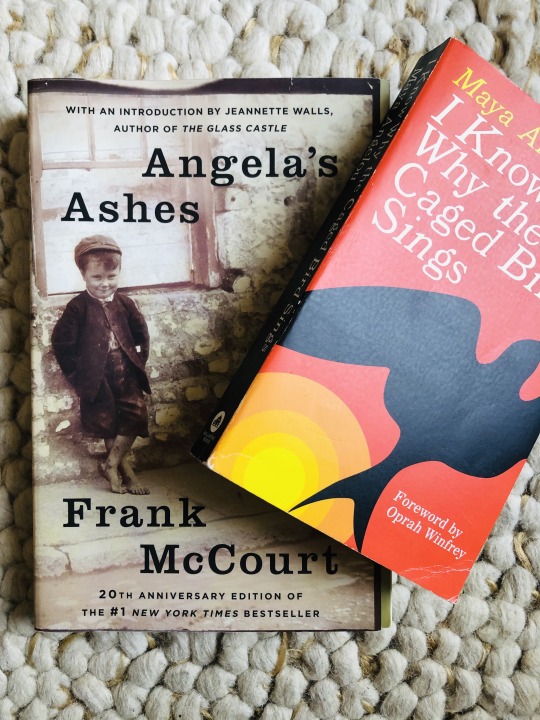
Two classics of the genre, here.
Many of us have read Maya Angelou’s book in high school. Both focus on the same thing: a period of time starting from birth and leading just up to late adolescence. Both are written like traditional first-person stories with beginnings, middles, and ends, and, were it not for our knowledge of their source material, might easily pass as romans a clef. I also think that both are examples of “misery lit,” although I think that that genre is overly hip and reductive for Angelou’s work, which is about so much more than just her misery. But they both focus on their childhood traumas in such a plain, unadorned, simple way, it is shocking and, for those of us struggling with these same issues, healing.
----------------------------------
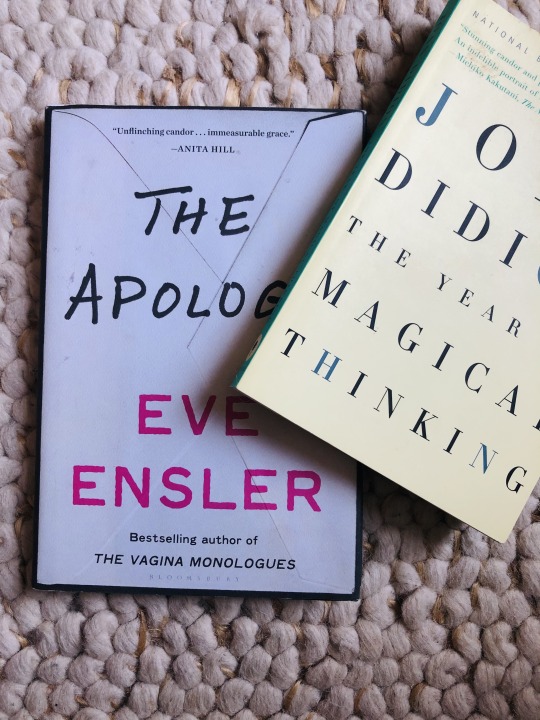
The Apology and The Year of Magical Thinking are examples of how the memoir can focus to a degree of incredible specificity. Both focus on pain but are concerned with different parts of experience. Didion writes only about one year of her life, while Ensler writes about almost the entirety of it, but with a focus on a single, prevailing experience. Both are harrowing in completely different ways and both are exquisite in the way they lift up their struggles to find meaning and truth, things that pertain to the reader’s own experiences and which he or she may also come into touch with in reading these books. They truly are gifts in that regard.
In a manner of speaking, these two books are like two, very long, book-length personal essays. They rigorously explore and interrogate their premises and do their best to extract whatever possible that is meaningful out of that exploration.
----------------------------------
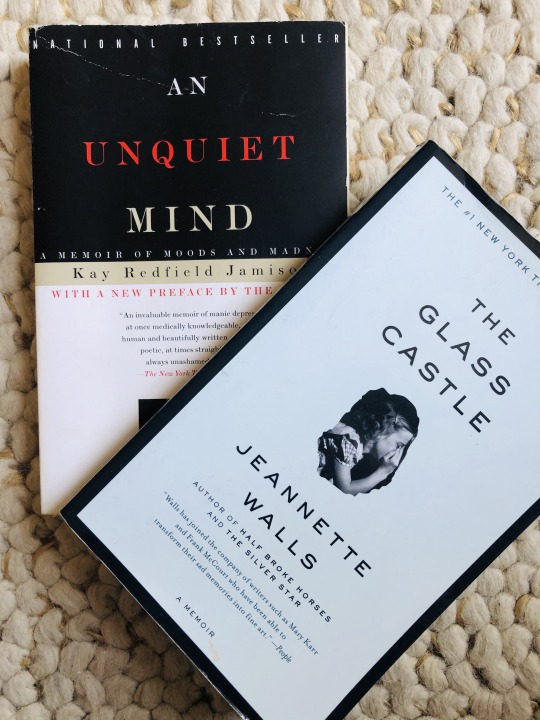
More “misery lit”! I actually don’t mean to be reductive in saying that. Both of these are fabulous stories concerning completely different encounters with mental illness and they are far beyond some hipster term of art. But there is a lot of memoir writing out there that explores the darker ways some of us were brought up and I don’t think there’s anything wrong with simply naming a certain type of writing that courageously explores how our childhoods might have been compromised.
In The Glass Castle it’s about her father’s mental illness and in An Unquiet Mind, it’s about the author’s own journey discovering and treating her bipolar disorder. Walls writes her story very much like it’s a novel, like Angelou’s memoir, and, also like Angelou, she writes it from the perspective of her child self and it is a compelling account as a result, full of tragic innocence and complicated encounters far beyond the reach of a child to properly grapple with.
Jamison’s book is very clinical, although she recounts her episodes frankly and shockingly and really brings you in to her subjective experience of insanity. These two books—not to mention Eve Ensler’s—have given me the courage to begin exploring my own encounters with mental illness and childhood trauma and to commit those experiences to writing.
----------------------------------
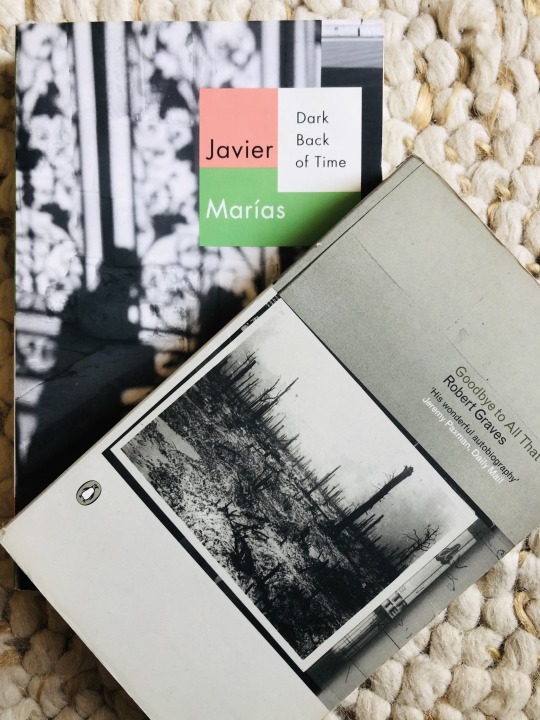
As I continued to research I started coming upon a very interesting type of memoir, the experimental memoir. That’s really interesting I thought. How does one write a memoir as a form of experimental art?
Not that this one is expressly experimental, but Robert Graves’ book is slightly off-putting in that fecund, experimental way: the bulk of it is dedicated to his experience in the trenches and it’s told with grit and harsh realism. But it starts with his schooldays and ends briefly, and curiously inconclusively, with scenes of fatherhood and tutelage. It’s a rather unique rendering of a life. Towards the end he admits that his original idea was to use the notes that he took on the frontlines for writing a novel but changed his mind after realizing that he would be desecrating his experiences and his memories and his sacrifices by layering a plot and storyline onto them. He then decided to write it simply as a factual account.
Dark Back of Time, however, is a full-on experiment in autobiography and it is always slipping in and out of reality, imagination and historicization. He spends a large amount of time writing about an old soldier who died accidentally on a hotel balcony in South America but he gets to this through talking about the reactions that his peers in Oxford had to one of his novels which they suspected made use of their lives. Truly an eye-opening experience to read autobiographical material refracted in this way.
----------------------------------
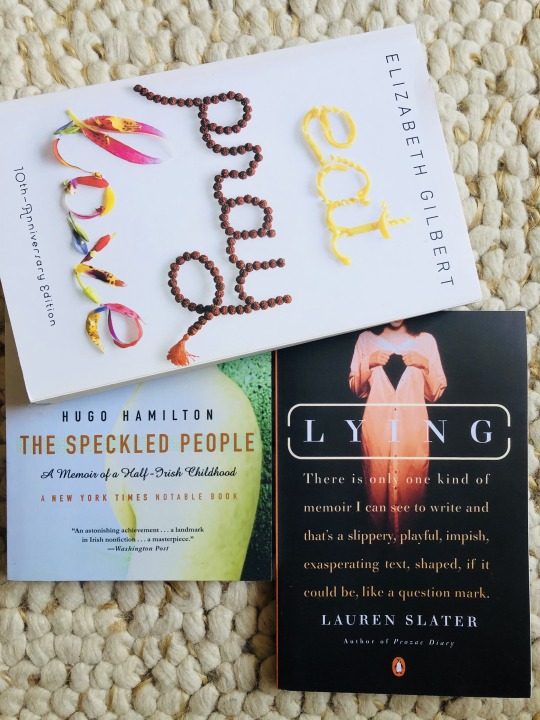
I haven’t read these three yet. They are “on deck,” as it were. Eat, Pray, Love needs little introduction, obviously. The Speckled People was highly recommended by a fellow writer and Lying came up in an online search as a prominent example of the experimental memoir.
At this point, it was already clear to me that I was writing a different kind of memoir than any of these examples. I realized that I was in effect writing personal essays without knowing it. I knew very early on that I wanted to eschew responsibility for an overarching narrative of any sort. I wanted to commit myself to specific topics that could be covered discretely in one chapter each. When I read the Graves’ passage regarding the desecration of his time on the battlefield, I thought of my own “war stories” and thought similarly that trying to give them a plot, while not exactly a “desecration,” would feel unnatural and inauthentic. What was feeling natural was to pick separate experiences in my life and devote a chapter to those I felt were strong enough for further elucidation. The time I got stuck on a mountain overnight with a friend. The shock of coming to NYU. The decision to leave the music industry. There were so many other parts of my life that seemed to deserve specific treatment in this way. I naturally started coming upon essay collections as a result.
II.
I took an online course by Alexander Chee called, “How to Write an Essay Collection” and afterwards it became much clearer what kind of book I wanted to write. I read about half of his reading list for the class and, along with the volumes I’d already dug into, I learned what a personal essay really was and what it wasn’t, and knowing this difference demonstrated to me quite clearly that the book I was writing wanted to be an essay collection in the truest sense of what an essay really is. The Leslie Jamison quote at the top of this blog post became true for me as well. My memoir could no longer stand being a memoir and had become a personal essay collection.
During the class, Alexander Chee recounted an irony regarding his own personal essay collection. He said that he found it curious when readers of his book would tell him that they found so much of him in it. “There’s actually not very much of me at all,” he said; and he mentioned this in order to illustrate what a personal essay collection is and what it isn’t. The reason why there’s not that much “of him” in his essay collection, nor, for that matter, why there isn’t much of any author’s life in any of their personal essay collections, is that a personal essay, despite being “personal,” is primarily geared towards externals not internals. “Pity the personal essayist,” the author Sloane Crosley writes in her New York Times review of Jamison’s latest essay collection, Make it Scream, Make it Burn, “fated to play with a reader’s tolerance for that most cursed of vowels. Too many “I”s and you’re self-absorbed; too few and: Where are you in this piece?”
Self-absorption as a liability in writing is understood enough, though, when it comes to autobiographies and memoirs, the liability becomes unavoidable and, if anything, necessary. We read those books exactly for the purpose of the big drop into an author’s psyche, willingly diving down the subjective abyss, basically swimming in “I”s (the best ones allow us to do this gleefully).
Not so in a personal essay, where the restriction on egoistic license holds. And yet: how do we include and implicate ourselves into the topic? without stepping on traps of self-absorption? This is what Chee was talking about when he said that there wasn’t much of him in his essays: not that he didn’t implicate himself in his narrations—he very much did—but that he skillfully observed this precarious balance.
That balance is undertaken quite differently depending on the author (and in my synopses of the collections I’ve read recently I’ll try to speak about how they’ve assigned “percentages of self” into their essays, what the “lean-to-fat" ratio is, for example, when “fat” could be understood as the strictly autobiographical portion of the essay). It can also vary according to the essay. In some cases it’ll be necessary to fully implicate oneself. In others, perhaps only a passing mention of the author’s impression of the events is needed. But there’s an essential aspect to what makes for a great personal essay, irrespective of ratios of personal to objective, that Charle’s D’Ambrosio captures beautifully in the introduction to his own essay collection:
My instinctive and entirely private ambition was to capture the conflicted mind in motion, or, to borrow a phrase from Cioran, to represent failure on the move, so leaving a certain wrongness on the page was OK by me. The inevitable errors and imperfections made the trouble I encountered tactile, bringing the texture of experience into the story in a way that being cautiously right never could.
This is kind of a Copernican revolution to me. I mean, it had never really occurred to me that you could be wrong and that would be a good thing. In writing I had always striven to make sure that I didn’t insult researchers, journalists, experts and scholars by misrepresenting the truth. Yet, here was basically a license to get it all wrong and admit it on the page and have that be a virtue of the writing.
What this tells me is that what remains key in the personal essay is not some authoritative stance, but the very uncertainty of the perspective, and how that might invite opportunities for a much more intimate relational structure with the topic matter on the part of the reader. This isn’t about ingestion (of data, of info, of ideas, etc.) but about contact. I see that as being very similar to the relationship between reader and author in a memoir, this premium on relation. The only difference—and for me, a very consequential one—is that the primary target of a personal essay’s sight is not the self qua self, but some implication with the content of reality on the part of the self. That intersection is what fascinates me more at this time than simple self-narration.
In this way, a personal essay can kind of be like a stop sign, a signal to halt the gyrating (mostly online) world, with its hyperlinks and ads and other pseudo-references. In fact, in his brilliant collection Proxies, Brian Blanchfield takes on this very task and turns the internet off when writing each of his essays in the collections. In order to take solace within the much more subjective account housed within the pages, an account at once open and tentative, based as it is in doubt, and hermetically sealed, shunning the greater world’s insistence on certification and realism, the essay becomes a prismatic utility for investigation, where perspective and subjectivity are king and certainty and objectivity are actually limiting.
The memoir offers something very direct to the reader: the author’s own struggle with, or journey through, some issue or period in life. The author is the chief protagonist in the drama, the star of, say, the cinematic adaptation of the book. The issues swirl around the protagonist but the camera stays trained on him or her. What I started to notice was that my mental gaze was always scudding away from the protagonist (me) and over to what else was in the frame. And so the personal essay as I began to learn about it became a much more appropriate vessel for these concerns, even as I knew that I would need to implicate myself in the action, keep myself in the frame. Striking that balance in a way that is both specific to me and my experiences and yet observant of the proper limits of the genre, so as not to veer away and “regress” back into memoir, has become my chief objective with each of the essays that I’ve been writing.
----------------------------------
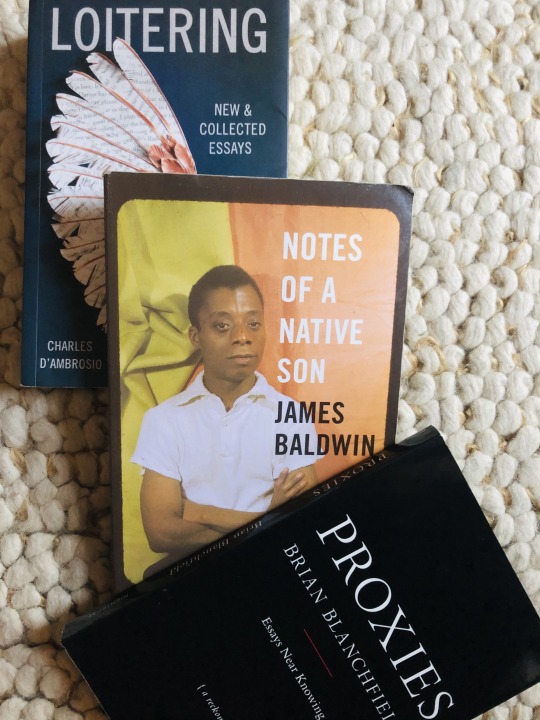
These three collections might be my bible for this project. Each are very different in style and application, but each is similar in that joyous experience of reading a paragraph and being so stunned by the insight that one has to turn the face away from the page for a moment (or two) to let it sink in. Baldwin is, of course, the king of this sort of thing. There were times while reading his essays when I actually had to straight up close the book and put it down in order to absorb what was going on. The title essay which is about Harlem, his father, and his early awakening to the depth of his country’s racism, is perfection on both the level of content and form. It does what an essay does best: leave you with the unequivocal residue of human feeling twisting around the grander issues with which that essay is concerned.
Each essay, in all of these volumes, is like a discrete nugget, a piece of writing, contiguous, open and alive, that can be read and reread, like an oracle you visit throughout your life, which, using the same words, speaks to you anew each time.
Ambrosio’s essays are absolutely nimble and virtuosic; his language is muscular and sinewy; his sentences are lean and long and you can ride them effortlessly and when you finish them and their paragraphs, you are left with an image of a truth that was planted in your sight without you knowing. It’s an exhilarating experience.
Blanchfield’s essays are a revelation of subjectivity. This volume was part of Chee’s reading list and I can’t express enough gratitude for having been directed to it. Perhaps Blanchfield is the master of nesting the autobiography within the confines of an essay. When he toggles between the external and the internal, you don’t notice it. It’s effortless. His ability to tell a giant story in one paragraph is inspiring. The tone and delivery is somewhat sacral, he’s a poet, after all. But it is also delicate, graceful, poised and elegant. And deeply personal. How someone can title an essay “On Frottage” and turn the reader’s attention to the true significance of the topic—AIDS and the gay scene in the 80s and 90s—and all of the social significance intertwined in it, along with implicating himself in a nakedly autobiographical way, is beyond me, but I am happy to be in the audience for it.
----------------------------------
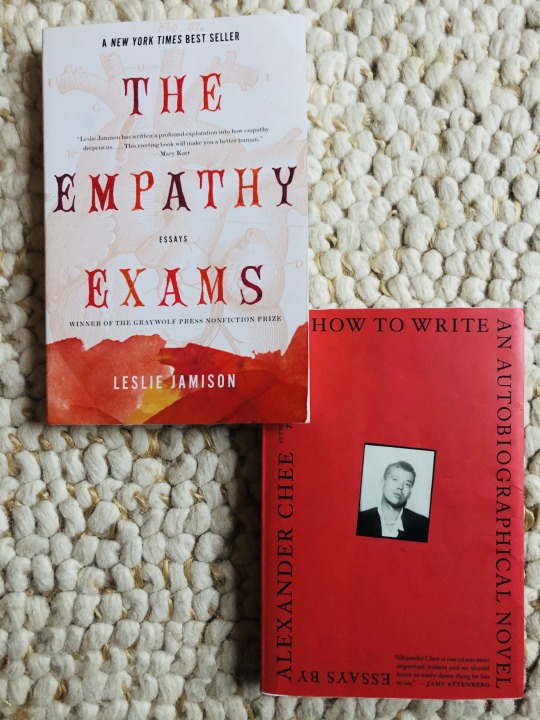
What I love about these two collections are their stealth and form. Their stealth comes from how they read, not so much as casually but as without artifice or adornment, and how this aspect lets the reader’s guard down, only to have some extremely penetrating conclusion arrive at the end of each essay, in a manner that the more plainspoken style did not necessarily anticipate. Chee’s prose particularly comes across as either supremely and dryly witty or as modest plainness, but when you finish one of his essays the takeaway is anything but those things; it is profound. Jamison as well. As for their form, they tend to do some adventurous things. One of Jamison’s essays uses a kind of diagram of storytelling which she learned in a writing class to “tell the story” of a traumatic episode involving a horrific episode of violence she experienced in South America. The essay is called “The Morphology of a Hit.” It’s a perfect example of something else that I really love about personal essays which is their ability to take leaps in form when that form enables a type of storytelling that otherwise isn’t possible. Chee does this very thing in a somewhat humorous essay, the titular one of this volume, which is just a long list of life hacks and writing tips. I’m really grateful for the insight that this man has given me into the writing process. My copy of his book is signed, as I first became aware of him at a reading of his with Edmund White at NYU which my good friend invited me to. So I’m very grateful to that friend as well! He also introduced me to Edmund White so it’s a double whammy!
----------------------------------
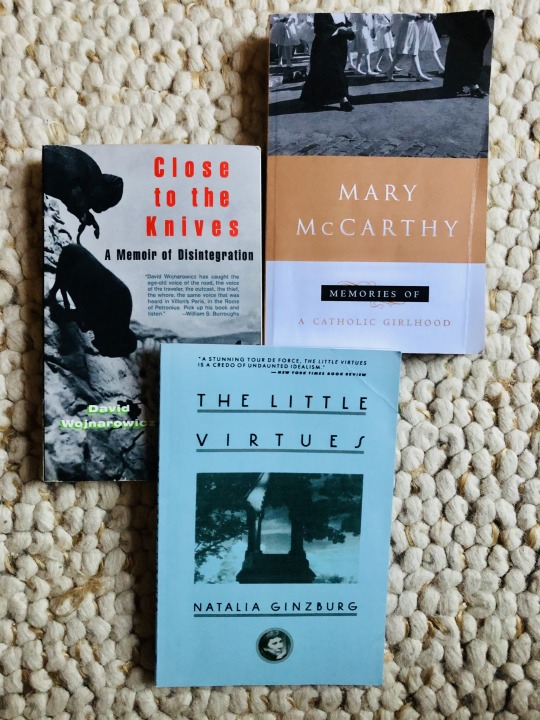
I would’ve never encountered these collections of my own volition without their inclusion on the reading list in Chee’s course, but I’m very happy that I read these. McCarthy’s essays are quite old, dating to the 50s and 60s, I believe, when they were originally published in The New Yorker. They’re all centered around her childhood years, either living with her grandparents or in an orphanage and they are remarkable portraits of intimacy and observation. The same with Ginzburg’s collection, although she writes in a much more enigmatic style. What inspired me most about her essays was how simultaneously aloof and vulnerable they are: she has a way of, say, writing about England, without ever even mentioning the name of the country, yet contriving a recognizable and incisive portrait of it, all from the vantage point of her own experience of the country during a certain time. Finally, there’s really nothing quite like Wojnarowicz’ book. It’s slightly Beat in tone, sometimes surreal and ecstatic, and then progressively more plainspoken and political. But it is all so very raw and pulsing with the heat of experience and desperation and anger. Wojnarowicz was an incredible artist, a sculptor and photographer and he lived in the East Village of the 80s and reports from the frontlines on the AIDS crisis. His work bears the stamp of a deeply tuned in artist confronting the hypocrisies and injustices of his time.
----------------------------------
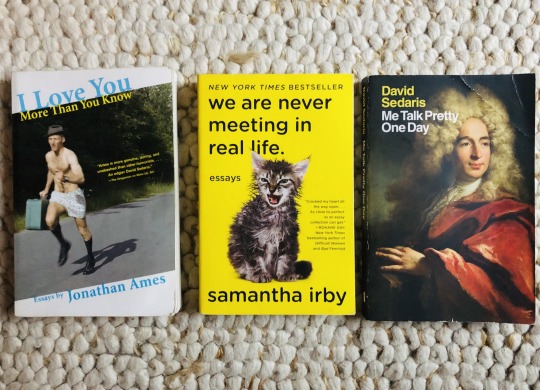
I put these three together mostly because these collections are explicitly comedic, although each has its own manner of using humor to communicate a deeper message. Jonathan Ames is well-known as a very funny novelist and the creator of the TV show Bored to Death. His essays are very short and very direct. There’s almost no commentary and he just narrates the events. The approach of leaving room for not knowing is very noticeable in his work, as he often qualifies his observations with humility and openness. The work comes across as very tender as a result. Irby is laugh-out-loud funny. I don’t know how she does it but she has a way of sending herself up and making fun of herself and her limitations that is both funny and painful at the same time. Commercialism, body positivity, and personal achievement are only some of the themes that are explored through that lens of self-effacement. Her ability to put herself under the most lacerating gaze of the authorial microscope and coming out the other end of that examination as a strong individual is unparalleled. I consider this volume must-reading material. In terms of exquisite construction and intelligence I would have to put Sedaris up high on the list, though his work is popular enough and his collections prodigious enough that his reputation for that kind of writing needs no further illustration here.
----------------------------------
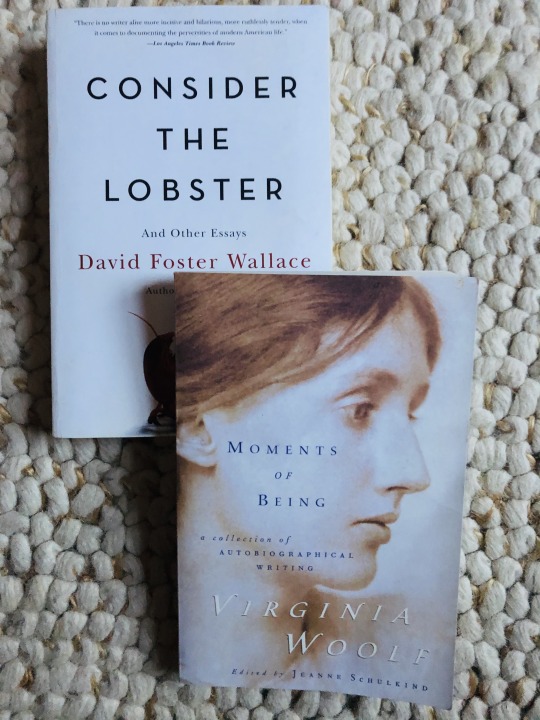
Virginia Woolf is popular as an essayist for collections published much earlier than Moments of Being, such as The London Scene. The essays here are actually very raw and unedited and so very sprawling, though obviously of high literary quality. She wrote them down like diary entries and then they were found after her death. They feel similarly to McCarthy’s essays in their naked observations of early childhood and family life. Juxtaposing this collection with DFW’s Consider the Lobster is a bold choice on my part, but it’s for the purpose of elucidating my previous point about that delicate “lean-to-fat” ratio I spoke about earlier in this blog post. Woolf’s posthumous collection is “all fat,” one could say, in that her focus is almost exhaustively on her own life and personal upbringing and subsequent marriage. These essays are basically memoir writing in the guise of the personal essay. DFW’s essays, by way of intense contrast, are almost “all lean,” in the sense that he spends almost no time talking about his personal life. The closest he gets to that is his essay on 9/11 where he goes over the details of where he was when it happened. The rest are what you’d expect from the author: penetrating accounts of the subtleties and hidden motivations of the cultures and people he investigates. He is basically like the most intelligent wartime journalist where his “wars” are the John McCain presidential campaign of 2000, the AVN Awards Ceremony, or the Maine Lobster festival.
----------------------------------
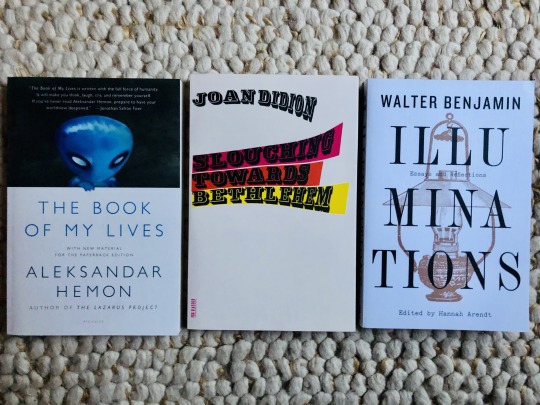
I have yet to read these collections but I’m very much looking forward to them. Hemon’s essays are about his upbringing in the war-plagued Balkans of the Nineties and subsequent emigration to the US. Didion’s basically needs no introduction as its de rigeur for essay writing. I’ve included Benjamin’s because of his critical insight. He’s not writing about his personal life, but his gifts for analysis will be really helpful to be exposed to for anyone undertaking the task of writing a personal essay. I have not included a picture of Susan Sontag’s collection Against Interpretation because it’s on order, but that one is also on deck. As are two other collections not pictured: Mary Oliver’s Upstream and Rebecca Solnit’s Hope in the Dark.
#charlesdambrosio#leslie jamison#james baldwin#vladmir nabokov#edmund white#frank mccourt#maya angelou#eveensler#joan didion#kay redfield jamison#jeannette walls#javiermarias#robert graves#elizabeth gilbert#hugohamilton#laurenslater#brianblanchfield#alexander chee#david wojnarowicz#mary mccarthy#natalia ginzburg#jonathanames#samantha irby#david sedaris#david foster wallace#virginia woolf#walter benjamin#aleksandar hemon#writing#memoir
17 notes
·
View notes